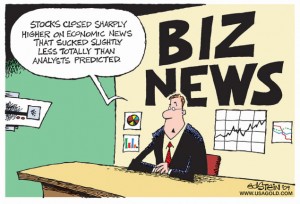 In “A League of Their Own,” that wonderful 1992 film, a young woman player makes a dunderheaded toss and breaks into tears as coach Jimmy Dugan (Tom Hanks) yells at her. “Are you crying?,” he asks, stunned. “There’s no crying! There’s no crying in baseball!”
In “A League of Their Own,” that wonderful 1992 film, a young woman player makes a dunderheaded toss and breaks into tears as coach Jimmy Dugan (Tom Hanks) yells at her. “Are you crying?,” he asks, stunned. “There’s no crying! There’s no crying in baseball!”
Boy, can I feel for Dugan. So far, I’ve had to deal with four incidents of tears in school. One time, I believe, the bad toss was mine. In the other cases, well, I’d point to hormones, undergrads facing job-like pressure for the first time or sheltered young women beginning to discover the world isn’t such a kindly place.
Still, I felt as flummoxed as Dugan did. Making girls cry is something only a true jerk would ever feel good about. This is so, even though a wiser colleague at Nebraska, veteran teacher and hard-boiled journalist Kathy Christensen, tells me tears come automatically with breasts. She shrugs them off.
Just under three semesters into my academic career, I don’t find the waterworks easy to dismiss. But, dear reader, you be the judge. Let me know if I blew it or could have handled these situations better:
Case No. 1 – I encourage an outstanding magazine-writing student to pursue an internship with Bloomberg Businessweek, my old employer. Before Bloomberg bought it, the mag had a tradition of taking on bright young interns, most of whom had no business training but who had lots of smarts. A colleague at the mag looks over her materials and says she’d be a wonderful recruit and he could use her skills in projects on business schools; he recommends her, as do I.
But, in myriad ways big and small, BW has changed. Bloomberg has her take a three-hour online test, parts of which are heavy on business knowledge (of which she has none, as everyone involved knows). She fails badly and folks there tell her she’s not a candidate. She comes into my office, crushed and weeping.
 So I feel like a heel. I put her into a bad spot, after all, and she suffers for it. It also doesn’t help my credibility with the new BW regime.
So I feel like a heel. I put her into a bad spot, after all, and she suffers for it. It also doesn’t help my credibility with the new BW regime.
Was I wrong? If students are willing to take a test and do badly, is it my fault? I warned her there would be business material on the test, even reviewed some general things with her. But I didn’t realize how much the game had changed. Seems to me I blew it. Did I?
Case No. 2 – As is my normal practice, I flash a student’s paper on the screen from a classroom projector. As a class, we criticize the work. I point out the positives and negatives of the piece, and suggest ways it could be improved. It’s pretty benign and no different from other critiques. We’ve had many such critiques that day. The class doesn’t say much one way or the other about it.
The student waits a bit after the lights come up, but then mutters to me, “you gave me a terrible grade on the paper, then humiliated me in front of everyone. I’m done. That’s it.” And she storms out, furious and in tears.
Her grade, a C+, was not on the screen, though her name was (regular practice in these editing and review sessions). Also, while rushing out, she informs me she will drop another class with me that she had signed up for the following semester and, later, she tops it all of by giving me a scathing evaluation at the end of the course.
Is it wrong to criticize students’ work publicly? The class involved peer-editing, so students criticized one another’s work in every assignment. And, in journalism don’t we face critics every time a reader opens a paper and curses about something he or she reads? In the end, I don’t fault myself for this one, but the drama did throw me.
Case No. 3 – A student has promised a colleague that she would deliver a finished video about a trip the colleague and I took with eight students to Kazakhstan in May. The students are no longer in our classes; some have even graduated, so we have no real sway over them.
The due-date comes and she hasn’t got the goods, but has several legit-sounding reasons. The colleague and I bemoan the fact that several students are behind – a hassle he has had in prior classes – and he gets a bit hot about the general problem. It’s a big thorn in the side for him.
The student, a smart and delightful videographer, breaks into tears. She then begins to apologize, explaining that it’s the time of the month for her (she really said that), she’s got problems with moving to a new city and she’s been working and traveling nonstop for weeks. My heart, frankly, goes out to her. I say, it’s not you that’s the problem here; it’s the general issue of how we can get students to comply with deadlines. I’m sure you will get your work done (which eventually she does, at least most of her work).
 When I complain to my colleague later that we shouldn’t be making girls cry, he says, “They make themselves cry.” It’s not his problem, but theirs, he suggests.
When I complain to my colleague later that we shouldn’t be making girls cry, he says, “They make themselves cry.” It’s not his problem, but theirs, he suggests.
So, was she being manipulative? Were we right to rant? Is a deadline a deadline?
Case No. 4 – A top student interviews with an internship recruiter. She says a couple silly things – including asking whether she needs to tell her soccer league that she can’t referee for a week during the internship – and strikes a tone the recruiter says is arrogant. In fact, he tells me afterward that he’s written “humility?” several times on his notes about her.
She comes by and I tell her I’m going to give her some no-holds-barred criticism about her interview. It won’t help her, I say, if I mince words, so I don’t. I tell her precisely what the interviewer had told me, and advise that appearing arrogant cannot help in such settings. You’ve got to seem humble, even it’s just for appearances. She breaks into tears, denies arrogance and says she was not asking for a week off for soccer. He misunderstood, she says, pleadingly.
This is one where tough-love was warranted, I believe. Still, the waterworks were troublesome. My own self-criticism: do mock interviews with students first from now on, giving them pointers that can spare them from making such mistakes. (By the way, she got the internship).
So dear reader, what say you? Are tears something teachers should slough off? Is it better that our kids shed them before they get into the workplace, where the consequences of mistakes can be far uglier? And how would you advise someone, still mystified by the half-adult psyches of undergrads, to deal with them? I’m thinking maybe I’ll just tell the kids that there is still no crying in baseball.



